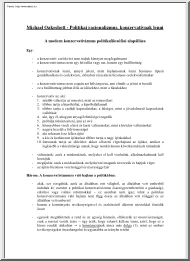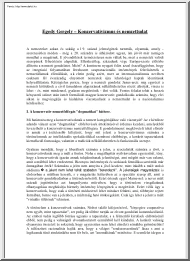Datasheet
Year, pagecount:2005, 4 page(s)
Language:English
Downloads:2
Uploaded:May 03, 2018
Size:483 KB
Institution:
-
Comments:
Attachment:-
Download in PDF:Please log in!
No comments yet. You can be the first!
Content extract
Source: http://www.doksinet CATO JOURNAL Conservatism: Burke, Nozick, Bush, Blair? Ted Honderich London: Pluto Press, 2005, 334 pp. You need not get very far into the new revised edition of British philosopher Ted Honderich’s survey Conservatism: Burke, Nozick, Bush, Blair? to detect that his attempt to unearth the “rationale” of conservatismits deep first principle, “the nature of its fundamental and general commitment” (p. 23)has gone seriously amiss To be precise: You need get no further than the subtitle. A political tradition that really did unite those four figuresa traditionalist monarchist, a radical libertarian influenced by Kant and Locke, an evangelical Christian neoconservative, and a New Labour leadernot merely by family resemblance or superficial policy overlap, but by way of some profound shared philosophical principle, that would be hot ice and wonderous strange snow. Others, apparently, have noticed that Honderich appears to be off on a snipe hunt, as he
attempts to address this objection in his new introduction. But he offers only the rather lame observation that one may generalize usefully about a class or set, despite inevitable differences between its members. It should be fairly obvious that this begs the question. The inconsistency of such a motley crew is, however, ultimately necessary to Honderich’s final conclusionmore in sorrow than in anger, surelythat “organized selfishness is the rationale of their politics, and they have no other rationale” (p. 302) There are some obvious problems with that conclusionamong them the existence of working-class cultural or religious conservatives for whom economic issues are at best an afterthought, but Honderich’s almost monomaniacal focus on redistribution allows him to neglect such problems. 644 Source: http://www.doksinet BOOK REVIEWS This misstep out of the starting gate is a fecund source of lesser errors, among them a tendency to harp on supposed internal contradictions
that merely reveal different strains of conservative thought, and a tendency to false generalization that produces some spectacular howlers. We learn, for example, that conservatives have no patience for “natural rights, abstract rights, rights in theory, human rights. For the most part they do not take seriously . anything other than established legal rights” (pp 34–35). There is, sure enough, a certain sort of conservative of which that might be said. But as a general description of modern conservatism in particular, it is close to the opposite of the truth: It is conservatives who are most disposed to deploy the rhetoric of natural rights. Whatever else one thinks of the anti-abortion movement, for example, it is scarcely built on the exclusive worship of “established legal rights.” It is illustrative that the example Honderich adduces in favor of this notion is that of Friedrich Hayek, whose rejection of economic “social justice” is taken as proof of hostility to
rights per sea wild form of argument that resembles nothing so much as the tendency, common to not a few conservatives, to infer that anyone who fails to share some parochial sexual mores, say, must be a nihilist who rejects the very idea of morality altogether. As a special bonus, this comes on the heels of the claim that conservatives “recoil from Utilitarianism and its greatesthappiness principle” (p. 34) Hayek, of course, was himself an “indirect” or “rule” utilitarian. Even when Honderich considers potential “rationales” that seem promising for a more narrowly conceived conservatismreverence of tradition and a preference for gradual reform over large-scale change, sayhe is forever informing the reader that he need not be detained further with this or that line of thought, precisely when one might wish he’d tarry a bit. A fondness for tradition cannot be constitutive of conservatism, he avers, because Burke would surely have opposed the government established by
the French Revolution if it had persisted a century, and modern conservatives were keen to undo the Soviet system decades after it was put in place. There are many ways one might reply herethe most obvious being that a willingness to make exceptions in the case of Stalinist dictatorships doesn’t mean respect for tradition can’t be a, even the, central and distinctive conservative value. Another is that a system under which a near-omnipotent government may radically alter society from year to year, however long it has lasted, might not count as a “tradition” or embody the desirable features of long-standing institutions in the same way that, say, the common law does. It might have been instructive to have seen the arguments for this kind of traditionalism examined a little less breezily, whether or not it is really the elusive sine qua non of conservatism. Much has been written in favor of traditional Western societiesthough one might not learn it from Honderichand there is much
of interest to be said against them, and against blind surrender to tradition, as well. But Honderich is too busy chasing after the dizzying array of lines of thought he’s assembled to 645 Source: http://www.doksinet CATO JOURNAL dwell long on any one, and in any event too repulsed by his subject to be eager to hold his nose long enough to carry out much sustained analysis. No surprise, then, that a reader seeking an introduction to conservative thought is apt to come away with a somewhat confused picture. Consider, for instance, his treatment of Robert Nozick’s famous “Wilt Chamberlain Example” from Anarchy, State and Utopia. In the course of contrasting what he styles “patterned” and “historical” conceptions of distributive justice, Nozick asks us to imagine a society in which each person’s share of wealth and resources is perfectly just, according to whatever pattern of distribution the reader cares to stipulate. He then imagines that large numbers of people
each voluntarily pay Wilt Chamberlain a quarter to watch him play basketball, leading eventually to his having far more than anyone else. Honderichthough, in fairness, he seems not to be alone in thisappears to think that Nozick is making the question-begging argument that redistribution would conflict with “liberty,” when the latter is defined in terms of robust private property rights. Yet this is rather plainly not Nozick’s point at all. Rather, Nozick is observing that there is something a bit queer about a theory of justice from which it follows that a (by stipulation) just situation should routinely be transformed into an unjust one by people’s voluntarily disposing of their just sharesthat something morally relevant is getting ignored in such a picture. There are related problems when Honderich considers Nozick’s treatment of Lockean property rights. Though he makes the fairand by now familiarobjection that there are significant lacunae in Nozick’s
sketchjustification of appropriation, an untutored reader could be forgiven for concluding, on the basis of Honderich’s book, that no one before or since had written anything about Locke’s theory of property. Honderich surrenders the opportunity to survey a literature replete with fascinating objections to Lockeand some equally fascinating defenses. Conservative economic thought is given similarly short shriftin essence reduced to the notion that incentives, in the form of potentially highly unequal incomes, are necessary for a high level of economic productivity. One wonders how battalions of economists on the right have managed to churn out so many books if this is their only substantive pointand, for that matter, why Honderich can’t manage much more by way of reply than the observation that some forms of work also have intrinsic rewards. We learn, too, that Milton Friedman thought a market system importantly connected with political and civil liberties, though we are not
graced with an understanding of why. We do not see, for instance, Friedman’s argument that government control of the means of (media) production may often make more heavy-handed forms of censorship otioseas, for instance, under the long rule of the Partido Revolucionario Institutional in Mexico. Honderich is satisfied to riposte that many countries with economies more regulated than conservatives advocate have not yet traveled down the road to serfdom. Those who might wonder 646 Source: http://www.doksinet BOOK REVIEWS whether Friedman really claimed that any market intervention or redistribution was incompatible with political freedom are reminded that the discussion began “with the words of advocates of the given argument,” though not, alas, any words showing that this really is their position which, of course, it is not. Having eschewed the kind of deeper probing that might have produced a more interesting overview and critical analysis of conservatism, Honderich must
nevertheless fill his allotment of pages somehow. One strategy to this end is a tendency to serially trot out preposterous straw men as potential ways of understanding this or that conservative principle, only to conclude that it would be uncharitable to impute such a view to conservatives. On the view that our identities are in many ways constituted by and dependent upon social traditions and institutions, for example, we are laboriously instructed that it’s probably best not to understand this as the claim that one’s “identity” in the logical sense of being a numerically distinct human being is so dependent. The rest of the padding is accomplished by appending to the chapters of intellectual history a series of desultoryin both senses of the wordjeremiads against New Labour, treating such timeless themes as whether the party improperly accepted contributions from a racing mogul. It is worth saying a word about tone. As may already be evident, this is an exceedingly mean
bookagain, in more than one sense of the term. It is the sort of thing Ann Coulter might produce if she were a leftist and fancied herself a serious thinker. As a random example of the sort of snide sniping that saturates the text: Some reflections of the political implications of widespread ignorance (in this case of the total needs and resources of an economy) are introduced as the “typical although unfortunately self-referring words of Friedrich Hayek” (p. 136) The kind of relentlessly bilious invective that can be entertaining in a short polemical essay soon becomes as tiresome as it is tendentious at book length, leaving the reader with the awkward feeling of having witnessed a Who’s Afraid of Virginia Woolf–style exchange, minus one participant. At a time when best-seller lists are clogged with the crudest sort of partisan hackery from every point on the political spectrum, a critical analysis of conservatism from a University College London philosopher ought to have been
a welcome respite. The disappointing truth, though, is that a more insightful attack on conservatism from the left might be found in the works of Michael Moore. Julian Sanchez Reason 647
attempts to address this objection in his new introduction. But he offers only the rather lame observation that one may generalize usefully about a class or set, despite inevitable differences between its members. It should be fairly obvious that this begs the question. The inconsistency of such a motley crew is, however, ultimately necessary to Honderich’s final conclusionmore in sorrow than in anger, surelythat “organized selfishness is the rationale of their politics, and they have no other rationale” (p. 302) There are some obvious problems with that conclusionamong them the existence of working-class cultural or religious conservatives for whom economic issues are at best an afterthought, but Honderich’s almost monomaniacal focus on redistribution allows him to neglect such problems. 644 Source: http://www.doksinet BOOK REVIEWS This misstep out of the starting gate is a fecund source of lesser errors, among them a tendency to harp on supposed internal contradictions
that merely reveal different strains of conservative thought, and a tendency to false generalization that produces some spectacular howlers. We learn, for example, that conservatives have no patience for “natural rights, abstract rights, rights in theory, human rights. For the most part they do not take seriously . anything other than established legal rights” (pp 34–35). There is, sure enough, a certain sort of conservative of which that might be said. But as a general description of modern conservatism in particular, it is close to the opposite of the truth: It is conservatives who are most disposed to deploy the rhetoric of natural rights. Whatever else one thinks of the anti-abortion movement, for example, it is scarcely built on the exclusive worship of “established legal rights.” It is illustrative that the example Honderich adduces in favor of this notion is that of Friedrich Hayek, whose rejection of economic “social justice” is taken as proof of hostility to
rights per sea wild form of argument that resembles nothing so much as the tendency, common to not a few conservatives, to infer that anyone who fails to share some parochial sexual mores, say, must be a nihilist who rejects the very idea of morality altogether. As a special bonus, this comes on the heels of the claim that conservatives “recoil from Utilitarianism and its greatesthappiness principle” (p. 34) Hayek, of course, was himself an “indirect” or “rule” utilitarian. Even when Honderich considers potential “rationales” that seem promising for a more narrowly conceived conservatismreverence of tradition and a preference for gradual reform over large-scale change, sayhe is forever informing the reader that he need not be detained further with this or that line of thought, precisely when one might wish he’d tarry a bit. A fondness for tradition cannot be constitutive of conservatism, he avers, because Burke would surely have opposed the government established by
the French Revolution if it had persisted a century, and modern conservatives were keen to undo the Soviet system decades after it was put in place. There are many ways one might reply herethe most obvious being that a willingness to make exceptions in the case of Stalinist dictatorships doesn’t mean respect for tradition can’t be a, even the, central and distinctive conservative value. Another is that a system under which a near-omnipotent government may radically alter society from year to year, however long it has lasted, might not count as a “tradition” or embody the desirable features of long-standing institutions in the same way that, say, the common law does. It might have been instructive to have seen the arguments for this kind of traditionalism examined a little less breezily, whether or not it is really the elusive sine qua non of conservatism. Much has been written in favor of traditional Western societiesthough one might not learn it from Honderichand there is much
of interest to be said against them, and against blind surrender to tradition, as well. But Honderich is too busy chasing after the dizzying array of lines of thought he’s assembled to 645 Source: http://www.doksinet CATO JOURNAL dwell long on any one, and in any event too repulsed by his subject to be eager to hold his nose long enough to carry out much sustained analysis. No surprise, then, that a reader seeking an introduction to conservative thought is apt to come away with a somewhat confused picture. Consider, for instance, his treatment of Robert Nozick’s famous “Wilt Chamberlain Example” from Anarchy, State and Utopia. In the course of contrasting what he styles “patterned” and “historical” conceptions of distributive justice, Nozick asks us to imagine a society in which each person’s share of wealth and resources is perfectly just, according to whatever pattern of distribution the reader cares to stipulate. He then imagines that large numbers of people
each voluntarily pay Wilt Chamberlain a quarter to watch him play basketball, leading eventually to his having far more than anyone else. Honderichthough, in fairness, he seems not to be alone in thisappears to think that Nozick is making the question-begging argument that redistribution would conflict with “liberty,” when the latter is defined in terms of robust private property rights. Yet this is rather plainly not Nozick’s point at all. Rather, Nozick is observing that there is something a bit queer about a theory of justice from which it follows that a (by stipulation) just situation should routinely be transformed into an unjust one by people’s voluntarily disposing of their just sharesthat something morally relevant is getting ignored in such a picture. There are related problems when Honderich considers Nozick’s treatment of Lockean property rights. Though he makes the fairand by now familiarobjection that there are significant lacunae in Nozick’s
sketchjustification of appropriation, an untutored reader could be forgiven for concluding, on the basis of Honderich’s book, that no one before or since had written anything about Locke’s theory of property. Honderich surrenders the opportunity to survey a literature replete with fascinating objections to Lockeand some equally fascinating defenses. Conservative economic thought is given similarly short shriftin essence reduced to the notion that incentives, in the form of potentially highly unequal incomes, are necessary for a high level of economic productivity. One wonders how battalions of economists on the right have managed to churn out so many books if this is their only substantive pointand, for that matter, why Honderich can’t manage much more by way of reply than the observation that some forms of work also have intrinsic rewards. We learn, too, that Milton Friedman thought a market system importantly connected with political and civil liberties, though we are not
graced with an understanding of why. We do not see, for instance, Friedman’s argument that government control of the means of (media) production may often make more heavy-handed forms of censorship otioseas, for instance, under the long rule of the Partido Revolucionario Institutional in Mexico. Honderich is satisfied to riposte that many countries with economies more regulated than conservatives advocate have not yet traveled down the road to serfdom. Those who might wonder 646 Source: http://www.doksinet BOOK REVIEWS whether Friedman really claimed that any market intervention or redistribution was incompatible with political freedom are reminded that the discussion began “with the words of advocates of the given argument,” though not, alas, any words showing that this really is their position which, of course, it is not. Having eschewed the kind of deeper probing that might have produced a more interesting overview and critical analysis of conservatism, Honderich must
nevertheless fill his allotment of pages somehow. One strategy to this end is a tendency to serially trot out preposterous straw men as potential ways of understanding this or that conservative principle, only to conclude that it would be uncharitable to impute such a view to conservatives. On the view that our identities are in many ways constituted by and dependent upon social traditions and institutions, for example, we are laboriously instructed that it’s probably best not to understand this as the claim that one’s “identity” in the logical sense of being a numerically distinct human being is so dependent. The rest of the padding is accomplished by appending to the chapters of intellectual history a series of desultoryin both senses of the wordjeremiads against New Labour, treating such timeless themes as whether the party improperly accepted contributions from a racing mogul. It is worth saying a word about tone. As may already be evident, this is an exceedingly mean
bookagain, in more than one sense of the term. It is the sort of thing Ann Coulter might produce if she were a leftist and fancied herself a serious thinker. As a random example of the sort of snide sniping that saturates the text: Some reflections of the political implications of widespread ignorance (in this case of the total needs and resources of an economy) are introduced as the “typical although unfortunately self-referring words of Friedrich Hayek” (p. 136) The kind of relentlessly bilious invective that can be entertaining in a short polemical essay soon becomes as tiresome as it is tendentious at book length, leaving the reader with the awkward feeling of having witnessed a Who’s Afraid of Virginia Woolf–style exchange, minus one participant. At a time when best-seller lists are clogged with the crudest sort of partisan hackery from every point on the political spectrum, a critical analysis of conservatism from a University College London philosopher ought to have been
a welcome respite. The disappointing truth, though, is that a more insightful attack on conservatism from the left might be found in the works of Michael Moore. Julian Sanchez Reason 647




